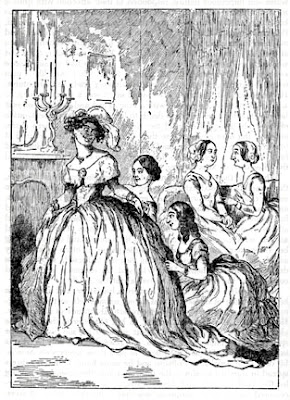Vanitas Vanitatum! Or: Life Is a Bunch of Beautiful Crap
I spent the summer reading William Makepeace Thackeray's Vanity Fair, and it was kind of a lovely slog. It really is nice to say to myself: I effing did it. Finished that bad boy this morning and felt it all come together in my soul in a way novels really should. Like you've been through a war and a couple marriages and a bunch of other shit, only this time with a large coterie of Victorian wannabes, an English middle upper-class that's frantically finding itself out of sync with reality, and yet clinging to old ways. Um. Like right now.
My biggest takeaway is the feeling this whole experience conjured inside my lowly skull: I was 13 and it was summer-break and I was supposed to weed the yard and garden, so I opened all the windows in the house so I could hear Guiding Light on the TV. If I couldn't sit on my ass and watch it, by God, I'd hear it!
I was addicted to soap operas when I was that age, that connection to people so alien to my existence they weren't people just glamorous manifestations of wealth and profession and superiority. City people, I guess. I yearned to be knee-deep in their melodramas and torture. "Stories" is what my Grandma and Grandpa Banner called them, and they were addicted too, mainly As the World Turns, but still...
To participate in lives so not-yours as to be particles of glass, spilled champagne, a lot of lying and scheming, and gowns, and every once in a while a trial. I was white-trash, of course, so the connection to lives beyond just simply held a strange and feverish fascination.
Anyway, as I read Thackeray's masterpiece I kept zoning in on that summer day as I pulled weeds and strained to listen to the schemes and dreams on Guiding Light through the windows of my house. There is a nondescript thrill connecting to a river of nonchalant debauchery and witty comebacks and phony struggles. Style, I guess, is the engineer of that thrill, and Vanity Fair, more than anything else, is a beautiful exercise in style, with substance following along grudgingly. It has something to do with the chatty Victoriana voice, of course, and also how the narrative avoids war and horror and poverty while being inextricably connected to them. Politics, the same. A feeling of overall disconnection from anything outside of Thackeray's zone of influence, what he sees and hears and reports. It becomes hypnotic around page 225, when Napoleon makes a guest appearance without appearing, when the Sedleys become paupers, when things just get strident, and yet the voice, the pace, the style do not yield to outside influences. The whole thing maintains its puppet-show luster.
Like Proctor and Gamble soap operas, back in the day. Wholly outside of time and space, the lives in Guiding Light and all the rest were lives manufactured to carry on a narrative involving treachery and adultery and all that, but also to solidify goodness and kindness. That's the trajectory Vanity Fair seems to have set: Becky, the schemer, Emmy the innocent, and all the rest, are gorgeous tropes, templates that a lot of Victorian and other literature imitated and homaged, and that got shot into the veins of pop culture through everything from Douglas Sirk movies to P&G and so on so forth. And now of course there's Bravo.
There's something beautiful and honest in Thackeray's sensibility though: a weird mannered heartfulness that allows you to go beyond trope and template and feel pulled apart from the wallpaper and made whole with almost every scene. Becky Sharp, of course, is the standout: slutty and meanspirited, but also innocent in her own ways, full of need and want. One of her best qualities: getting the joke. That seems to be her lot in life.
Thackeray kind of does the same. He gets the joke. He posits the whole enterprise as some beautiful, dumb but instructive puppet-show throughout. His words at the end:
"Ah! Vanitas Vanitatum! which of us is happy in this world? Which of us has his desire? or, having it, is satisfied? -- Come, children, let us shut up the box and the puppets, for our play is played out."




Comments
Post a Comment